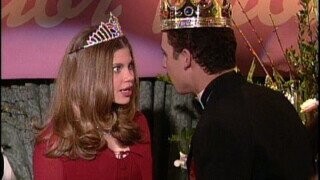The Behind-the-Scenes Politics of Safe Sex in ‘Boys Meets World'

Why does every sitcom have a podcast? In an age where fans of The Office, It’s Always Sunny in Philadelphia, Scrubs, Community, Parks and Recreation, New Girl, and apparently Boy Meets World can get unfiltered accounts of life behind the scenes on their favorite series, followers will inevitably be exposed to some of the strangest storylines and backstage politics that now needlessly cloud our nostalgic recollections of beloved shows.
On a recent episode of Pod Meets World, a Boy Meets World rewatch podcast hosted by Danielle Fishel and Rider Strong, Topanga and Shawn lifted the veil on a controversial episode of the beloved coming-of-age sitcom and revealed the complicated politics at play when an ABC series decides to tackle the subject of teen sex during the later years of the AIDS epidemic. Because letting childhood memories remain untarnished was a luxury that only existed before actors figured out how to use podcasting equipment.
The episode in question, titled “Prom-ises, Prom-ises,” premiered at the end of the show’s fifth season to a light controversy regarding the sensitive subject matter – the episode shows Cory and Topanga debating the possibility of taking one another’s virginity on prom night. Though the power couple of the ‘90s eventually elected to practice abstinence, the episode was banned from The Disney Channel over fears that the themes presented by the plotline were too mature for a family audience.
Don't Miss
Recently, Fishel and Strong were joined on Pod Meets World by Eric Matthew actor Will Friedle, and the trio discussed the difficult conversations that were had during production of “Prom-ises, Prom-ises,” specifically regarding the omission of any mention of safe sex practices at a time when the world was still reeling from the AIDS crisis.
Said Strong on the subject of safe sex in the teen-targeted broadcast sitcom, “The fact that we would not bring up Cory and Topanga using condoms or having a discussion about birth control at all, and yet the entire episode was about will they or will they not … I remember just being so upset.” Strong recalled a conversation he had with the show’s creator and executive producer, Michael Jacobs when he asked the showrunner, “Can we talk about this? Maybe you generationally don’t understand that, but we were growing up in the era of AIDS, this is something that we have to talk about. When you are discussing losing your virginity, you discuss how you’re going to do it and how to be safe about it.”
Friedle vaguely echoed Strong’s sentiments on the conversation – or lack thereof – about safe sex practices, saying “I remember also feeling very uncomfortable the whole week for similar reasons, but I don’t have specific memories other than just, kind of, ickiness about the week.” Strong’s protestations fell on deaf ears, as no mention of condoms or any other safe sex practices were portrayed on the program. Abstinence-Only Education won out at John Adams High.
The discussion over proper sex education for teenagers is both important and complicated, and the efficacy of ABC’s apparently preferred option of abstinence-only has been resoundingly debunked. Strong’s questions for his boss are poignant ones to ask in this debate, but a family-friendly, multicam broadcast sitcom feels like a weird battleground for such a sensitive subject. Tackling teen sex was a strange decision from the jump for a show that very rarely tried to make a statement on serious issues, and the complicated context of the AIDS epidemic makes “Prom-ises, Prom-ises” a baffling relic from the Milennial generation’s increasingly nuanced childhood.
Next we’re going to hear about how Teenage Mutant Ninja Turtles didn’t do enough to combat adolescent homelessness among terrapins.